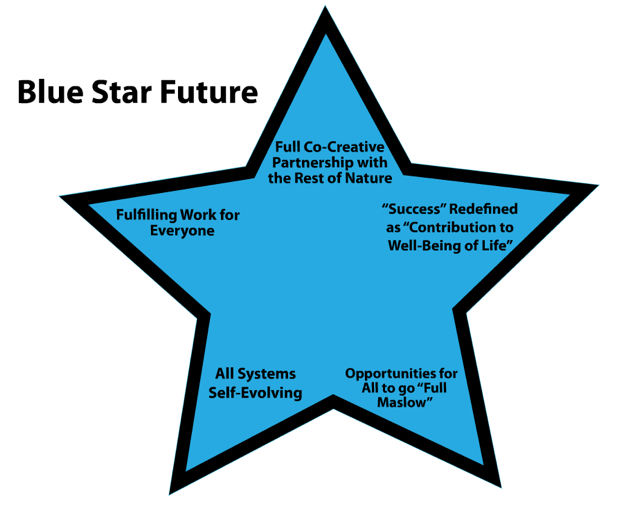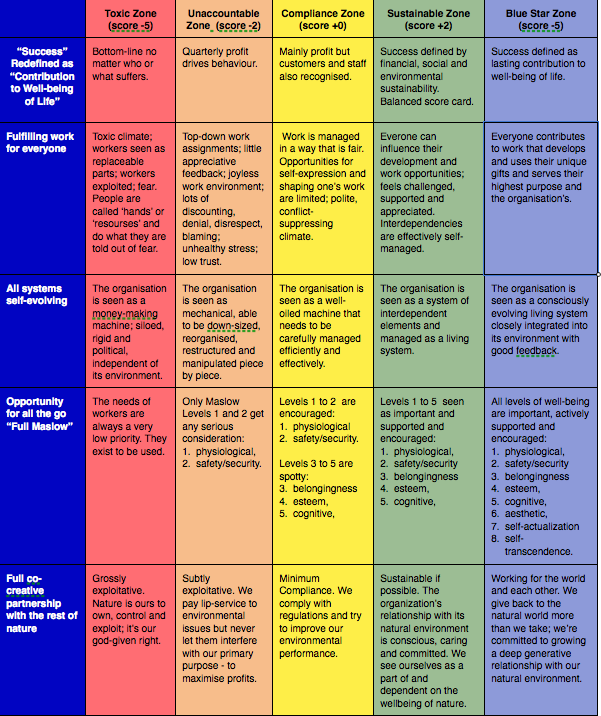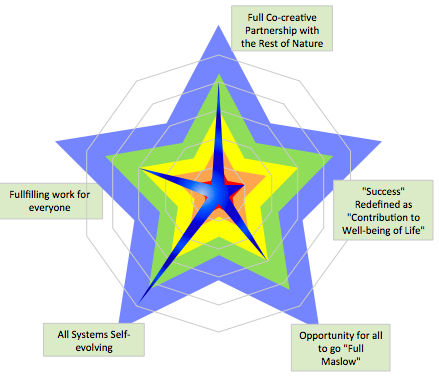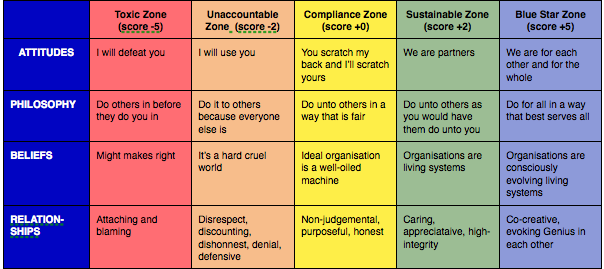
Contact Manager
Phone:
+64 21 620 456
16 Kauri Street, Woburn, Hutt City, New Zealand
email:
Manager@virtual.co.nz
 |
How to future-proof your organisation for the next 50 years
Recently I've been working on an 'I can't get it out of my mind' project called the Wellington Blue Star Future. The aim of the project is to make the Wellington Region the most livable region in the world, beyond sustainability. At the start I was attracted by the audacity of the aims, the people who were involved and some of the wonderful change management approaches our American mentor Bill Veltrop introduced; but soon I started to realise that these ideas would also be important to my clients who want to future-proof their organisation for the next 50 years.
I have always been attracted to the idea that the good guys win in business as in every other part of life - what you give is what you get back. Often over the years, this faith has been shaken when reckless greed and dishonesty seemed to be rewarded with high growth and profits. At these times it seemed Pollyannaish to maintain a blind faith in the face of the contra evidence. But recently new studies reported in "Good Company" by noted economist Laurie Bassi shows that the good guys really do win.
The Blue Star Future is the ultimate way to play 'good-guy-business' and win in the process.
Blue Star Future
The Blue Star Future has five starpoints and they apply at least as much to your organisation as they do to the Region. They are:

Lets briefly examine each of the five starpoints from the perspective of the success of your organisation over the next 50 years.
1. Opportunities for all to go full Maslow
As you know Abraham Maslow wrote about the eight needs of all humans:
- Physiological needs include air, water, food, shelter, warmth, sleep, sex, and so on.
- Security needs include protection from the elements, social order, law, and so on.
- Social needs include love, family, relationships, work group, and so on.
- Ego needs include achievement, reputation, responsibility, independence, prestige, status, and so on.
- Cognitive needs include knowledge, meaning, and self-awareness.
- Aesthetic needs include beauty, balance, and form.
- Self-actualisation needs include to 'become what we are capable of becoming' and being our greatest achievement.
- Spiritual needs include achieved through transcendence and helping others to achieve self-actualisation.
Here is the challenge, to create an organisation where everyone:
- Feels good about how they are spending their life
- Is aware of the choices they have made
- Nourishes something that is important to them
- Understands their purpose in life
- Understands their unique skill, or as I like to call it, find your genius
- Uses their unique skill to further their purpose.
Can you imagine the success that would come to an organisation that became "full Maslow" and met all five Maslow needs for their stakeholders? Just imagine the energy within an organisation where everyone gave their greatest achievement and had become what they were capable of becoming. This organisation would definitely be rewarded with profit and longevity well beyond 50 years.
2. All systems self-evolving
Many managers believe their organisations are 'mechanical' and can be driven and controlled like a machine; therefore they 'restructure', 'downsize' and 'reengineer' them. For the most important things in an organisation (culture, relationships, teamwork and customer service) it's more accurate and helpful to see them as 'organic'; more like a garden or a forest that evolves by itself. They are not things you can build from a blueprint, like a house, by specifying and assembling a series of materials and actions. It is far more subtle than that. Like all emergent properties they can be encouraged, led and given visibility; but they can't be commanded or pushed into being.
It's more accurate and useful to see culture, relationships, teamwork and customer service as natural byproducts of a high-performing organisation. Systems thinking and complexity science shows that like all emergent properties, good culture, relationships, teamwork and customer service are the natural way of being and they will emerge automatically at the level of the whole system once it achieves the required level of interconnectivity, increased communication, deeper relationships and improved trust.
The old (current) mechanical image is unbelievably wasteful. By focusing topdown on structure, rules, constitutions and legislation they drain the life from their organisation; and by constantly structuring and restructuring managers keep themselves so busy and important they fail to work on the garden. They don't prepare the soil (build trust, connection, relationships, communication); sow the best seeds; develop green fingers (develop leadership skills that are both magic and logic); tend the plants (listening more than telling, questions more than answers, and encouraging more than criticizing); thin and prune (allow space and time by removing barriers and bottlenecks); tend and nurture (tell stories, amplify wins and prune the unsuccessful); or harvest properly (celebrate wins).
As the founder of the first 'virtual' organisation in New Zealand, I am particularly attracted to this startpoint. Can you imagine the success and longevity of an organisation where culture, relationships, teamwork and customer service were allowed to self-evolve naturally in a well-tended garden? This organisation would definitely be rewarded with profit and longevity well beyond 50 years.
3. Fulfilling work for everyone
Work is defined as activity involving mental or physical effort done to achieve a purpose or result. It's not necessarily paid work or work in an organisation; however, since this paper is about future-proofing your organisation, one of the more succinct statements of a fulfilling week comes from Doc Searl's acronym: TBIF - Too Bad It's Friday. If people could get to Friday and say "TBIF", would this organisation be rewarded with profit and longevity well beyond 50 years? We think so. Unfortunately, TBIF is not all that common. Gallup research of New Zealand workplaces shows 15% are 'actively disengaged' and 68% are 'disengaged.' Only 17% are 'engaged' and this is down from 23% in 2002. Gallup estimates the annual cost of this is NZ$3.67 billion. Liberating the human spirit at work has been my quest for over 20 years.
Unfulfilling work results from constraining Stories and Structures. Most attempts to make work fulfilling have focused on changing constraining structures like technology structures, organisational structure and process structures, mostly because they are concrete and easy to change
While these are important it is easier, far cheaper and more effective to start by changing the constraining stories:
Current Constraining Stories
- People are human resources or hands
- Change processes need to be controlled top-down
- The world is like a machine
- We are all separate
- Competition is the natural order.
New Liberating Stories
- Together people are can do anything. We need to tap into body, head, heart and soul
- Change processes need to be top-down and bottom-up
- The world is a living self-evolving system
- We are far more closely connected than most people realise
- Collaboration is the natural order.
4. Co-creative partnership with the rest of nature
There is no doubt that the rest of nature is in trouble. This is reflected in all major indicators like the ozone layer, climate change, water quality, air quality and species extinction.
Business has begun to be quite proactive in this starpoint. We see progress in triple-bottom line and the sustainability movement, and many organisations are already on-board and see green dollars as a major contribution to their profits. Despite this success, business has a long way to go. I agree with Bill Veltrop when he says: Our resource base, planet earth, is shrinking while our population continues to expand; increasingly, cracks are appearing in the capacity of our communities, ecosystems, and landscapes to provide the goods and services that sustain our well-being. These intertwined systems are like a boat at sea, constantly confronted with surprise events such as storms. The degradation of these slow variables is reducing our "freeboard," our ability to survive these storms.
Can you imagine the success and longevity of an organisation that was truly successful in helping to solve these life-threatening issues? This organisation would definitely be rewarded with profit and longevity well beyond 50 years.
5. Success redefined as contribution to well-being of life.
Today most organisations define success by measuring profit and return on assets which are the result (not the cause) of yesterday's success. Given that what you measure is what you get, organisations need to redefine success by measuring things that will cause tomorrow's success. Things like safety, health, knowledge, skills, wisdom, attitudes, hope in the future, absence of fear, relationships, respect, awareness, sense of purpose, beauty, self-control, freedom and happiness and environmental affects.
How to assess your organisation
Can you imagine the success that would come to an organisation that measured and became strong in all of the starpoints? It would be like five twines woven into a rope all pulling in the same direction and providing an unbeatable competitive advantage. This organisation would become a legend. It would rocket to success and definitely be rewarded with profit and longevity well beyond 50 years. But, its not just some far-off success we are talking about. Any organisation able to be at the front in these starpoints will succeed today as well.
Rate your organisation on each of the five starpoints listed below:
- For each starpoint in the Toxic Zone score -5
- For each starpoint in the Unaccountable Zone score -2
- For each starpoint in the Compliance Zone score +0
- For each starpoint in the Sustainable Zone score +2
- For each starpoint in the Blue Star Zone score +5.
In our experience most organisations are in the Compliance Zone with an average score of +0 at best.

Alternatively you if you request a copy I will email you the flash new Assessment Tool created by Jacob de Feijter so you can share it with your colleagues:

New ways of thinking
In Bill Veltrop's view achieving the Blue Star Zone will take a new way of thinking and being. For example the organisational philosophy will need to move progressively from lower levels towards the conscious level:
- Toxic level (-5) : 'Do others in before they do you in'
- Unaccountable level (-2): 'Do it to others because everyone else is'
- Compliant level (+0): 'Do unto others in a way that is fair'
- Sustainable level (+2): 'Do unto others as you would have them do unto you'
- Conscious level (+5): 'Do for all in a way that best serves all.'
Rate your organisation its attitudes, philosophy, beliefs and relationships listed below; give yourself -5 for each starpoint in the Toxic Zone through to +5 for each starpoint in the Blue Star Zone. In our experience most organisations are yellow at best and unfortunately many are still in the Toxic Zone.

Summary
All this may sound like a 'pipe-dream' and hopelessly optimistic. The Wellington Blue Star Future group spent a significant amount of time debating this issue and convinced ourselves that the five starpoints are achievable in Wellington Region partly because we have many wonderful tools like 'Infinite Games' and approaches like the importance of storytelling and how to make large-scale change. I feel equally confident about it at an organisational level. I see my role as helping my clients more towards the Blue Star Zone.
So, you've assessed your organisation and found that it is not as strong as you'd like it to be; what can you do? Research shows that the only six things that matter in business and I'd start with Strategy and leadership development:
Give me a call if you'd like to know more about how to future-proof your organisation or would like to become involved in the Blue Star Future within Wellington Region. We need all the help we can get. The future is not yet assured; either for the Region or your organisation.
Warmest wishes,
Bruce.
Bruce Holland
Virtual Group Business Consultants
16 Kauri Street, Woburn, Hutt City, New Zealand.
Bruce.Holland@virtual.co.nz
Phone: +6421 620 456 or Skype Bruce.Holland
www.virtual.co.nz
Go back to Index for Strategic Snippets
Key words: Leadership, leadership development, leadership management, leadership training, leadership program, leadership skills


